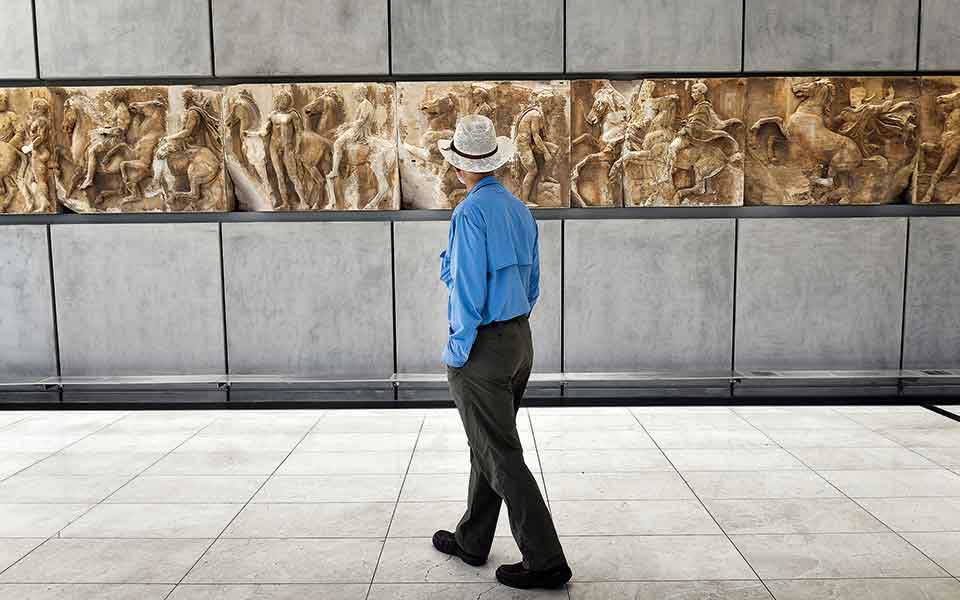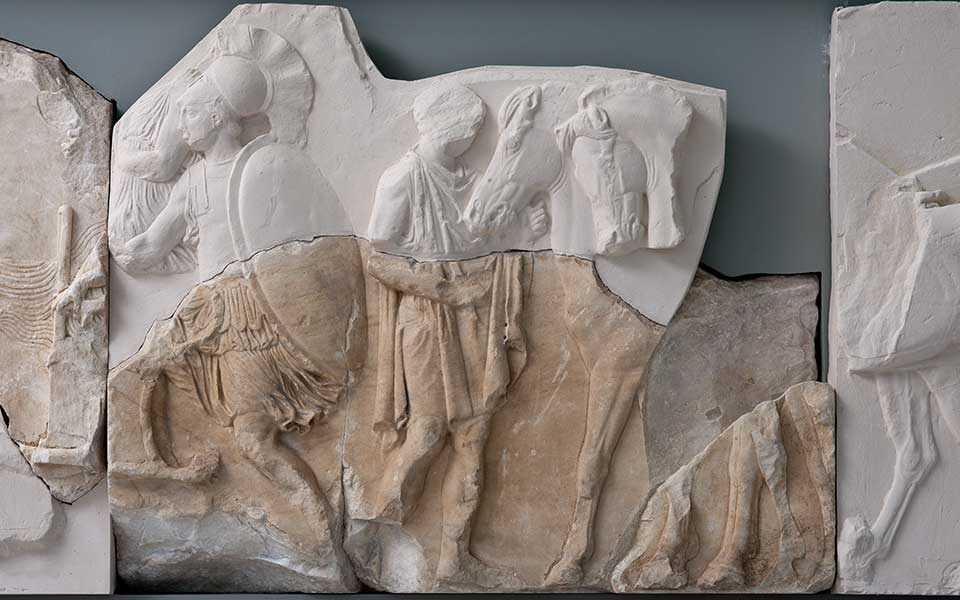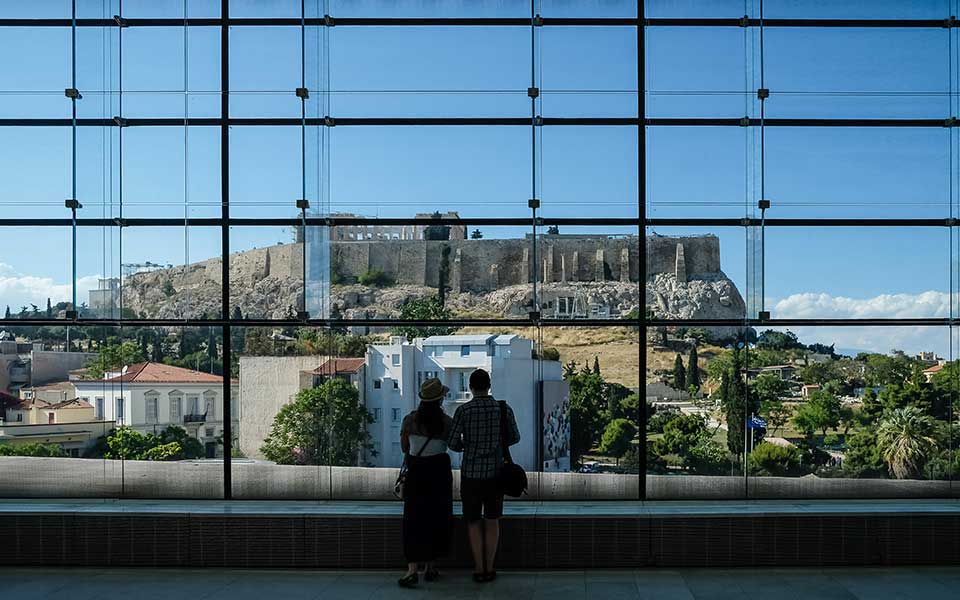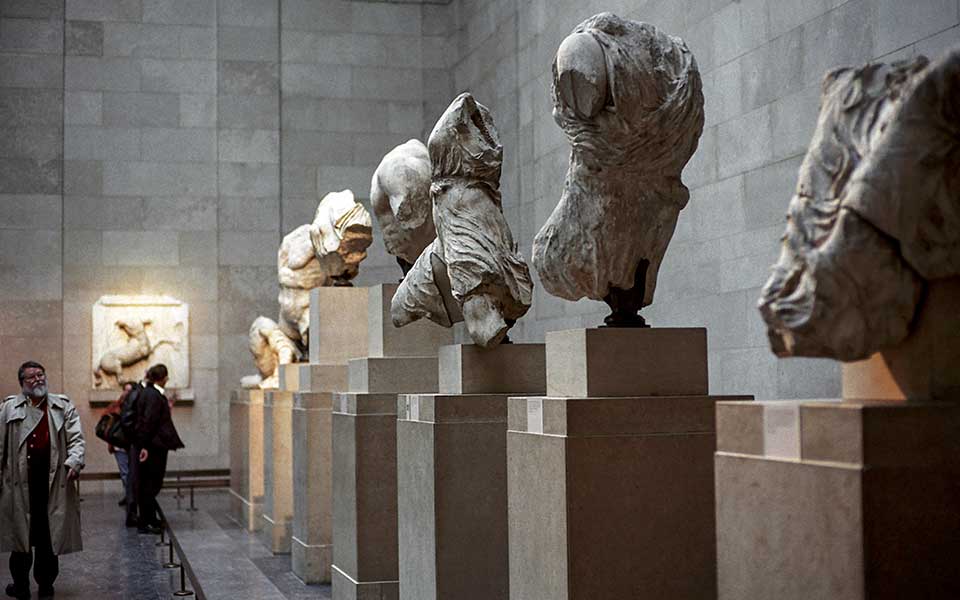The British Museum already has one of the best collections of ancient Greek artifacts on display anywhere in the world, and it is certainly not short of visitor attractions to draw in the crowds. The return of the Parthenon sculptures would in no way diminish that.
Setting a good precedent was the return in 2006 of a sculptural fragment from Parthenon’s frieze held in the collection of the University of Heidelberg. The fragment came from the north frieze, depicting the lower foot of “Figure 28” (a thalophoros, a figure holding an olive branch) and part of the garment’s edge. This symbolic act of return constituted the first repatriation of any part of the architectural or sculptural decoration of the Parthenon from a museum outside of Greece.
It was followed later that year by the return of an architectural fragment from the Erechtheion from the collection of the Museum for Mediterranean and Near Eastern Antiquities in Stockholm, Sweden. During a special repatriation ceremony in Athens, representatives of the Swedish museum expressed hope that the return of the fragment would send a clear signal to the British Museum.

© Shutterstock
Efforts for international mediation in the long-standing issue have been ongoing since 1983. Leading from the front, UNESCO’s Intergovernmental Committee for Promoting the Return of Cultural Property (ICPRCP) has adopted at least 16 recommendations for bilateral negotiations on the Parthenon sculptures, which, among others, call on Greece and the UK to “intensify their efforts with a view to reaching a satisfactory settlement.”
In 2013, following a meeting between the Greek Minister of Culture and Sport and UNESCO’s Director-General, UNESCO formally invited the UK Government and the British Museum to enter into mediation talks. The invitation was turned down, two years later, in 2015, citing the same old and tired arguments regarding the British Museum’s legal acquisition and ownership of the sculptures.
But there is hope. In September 2021, auspicious for being the bicentennial year of the start of the Greek Revolution that set Greece on the path to becoming a free and independent state, the Greek government and ICPRCP made a significant breakthrough. During the 22nd session of the ICPRCP in Paris, following intense talks, the committee for the first time acknowledged that the matter is an intergovernmental one, and not one between the Greek state and the trustees of the British Museum. Together with its recommendation, which referred to the poor conditions in which the sculptures are being kept in the Duveen Gallery, the ICPRCP, in full support of Greece’s legal and moral claims, voted unanimously to pass a decision urging the return of the Parthenon sculptures:
“The decision of the 22nd session of the ICPRCP’s Commission expresses its strong dissatisfaction with the fact that the issue remains unresolved due to the United Kingdom’s stance. In addition, it urges the United Kingdom to reconsider its position and enter into a bona fide dialogue with Greece, emphasizing the intergovernmental nature of the dispute.”
Christopher Hitchens (1949-2011) - Journalist, columnist and orator; author of “The Parthenon Marbles: The Case for Reunification” (1997)
“The ‘Elgin line,’ of sculptural partition and annexation, runs through a poem in stone that was carved as a unity and that tells a single story. It even cuts through figures and characters in that story. The body of the goddess Iris is now in London, while her head is in Athens. The front part of the torso of Poseidon is in London and the rear part is in Athens. This is grotesque.”

© Acropolis Museum, 2021. Photo: Socratis Mavrommatis
Recent developments and what British voters can do
If you’re registered to vote in the UK and you’d like to help the campaign for the reunification of the Parthenon sculptures, we urge you to write to your local Member of Parliament asking them to raise the issue in the House of Commons. It’s important that you stress the issue become an intergovernmental one – one between the Greek state and the UK.
As it stands, the UK government blindly supports the position held by the trustees of the British Museum regarding their legal claims of ownership of the sculptures since 1816, and is keen for museum professionals in Greece and the UK to continue to have dialogue. The Greek government, on the other hand, now with the full and unequivocal support of the ICPRCP, continues to press the UK to upgrade the longstanding issue and enter into direct talks at an intergovernmental level.
To break the stalemate, UK voters must petition Parliament to debate and amend the British Museum Act of 1963, which outlines the composition and general powers of the British Museum trustees. The all-powerful trustees exist as a 25-person corporate body, one member appointed by the Queen, 15 by the Prime Minister, four by the Secretary of State and five appointed by the trustees of the Museum. Their role is the general management and control of the British Museum, including the keeping and inspection of collections, and the disposal of objects.
A parliamentary debate would allow the House of Commons to carefully consider the issue of the Parthenon sculptures and further reflect on what responsibilities they wish to give to the trustees of the Museum.
Nadine Gordimer (1923-2014) - Nobel Prize winner, writer and political activist
“The Parthenon Gallery in the new Acropolis Museum provides a sweep of contiguous space for the 160-metre-long Panathenaic Procession as it never could be seen anywhere else, facing the Parthenon itself high on the Sacred Rock. But there are gaps in their magnificent frieze, left blank. They are there to be filled by an honorable return of the missing parts from the British Museum.”

© Shutterstock
Vesting the trustees with the right to voluntarily return the sculptures would affirm the British nation’s respect and admiration for the immense legacy of ancient Greece, promote the indivisibility of Classical Greek art, and enhance the reputation and esteem of the British Museum in the eyes of the world. As such, the repatriation of the sculptures would create a win-win situation.
Seizing on present momentum, Greek Prime Minister Kyriakos Mitsotakis pressed his UK counterpart, Boris Johnson, on the case for reunification. True to form, Prime Minister Johnson’s response reiterated the UK government’s longstanding position that the sculptures were “legally acquired by Lord Elgin …,” and that the issue is not an intergovernmental one.
In a swift riposte, the Greek premier appealed to Johnson’s self-proclaimed admiration for ancient Greece in an article for the UK’s Mail on Sunday: “I believe that the classical scholar in Boris Johnson knows that he has a unique opportunity to seize the moment and make this generation the one that finally reunited the Parthenon Sculptures.” He added that the return of the sculptures would open the door for long term loans to the British Museum of other iconic Greek artifacts.
In the immediate aftermath, there was a groundswell of support from media outlets in the UK and around the world in support of the Greek cause.
Despite the stubborn refusal of the UK government to enter into any meaningful dialogue with Greece, the ICPRCP’s potentially game-changing decision gives new hope to the nearly 40-year campaign, especially now that public opinion in Britain has shifted in clear favor of the return of the sculptures to their rightful home in Athens.
Stephen Fry - Actor, writer and philhellene; author of “Mythos: A Retelling of the Myths of Ancient Greece” (2017)
“We are discussing a specific part of an existing building, which we now know can be properly and professionally curated and displayed … Greece made us. We owe them. They are ready for their return and have never needed such morale-boosting achievement more. And it would be so graceful, so apt, so right.”











